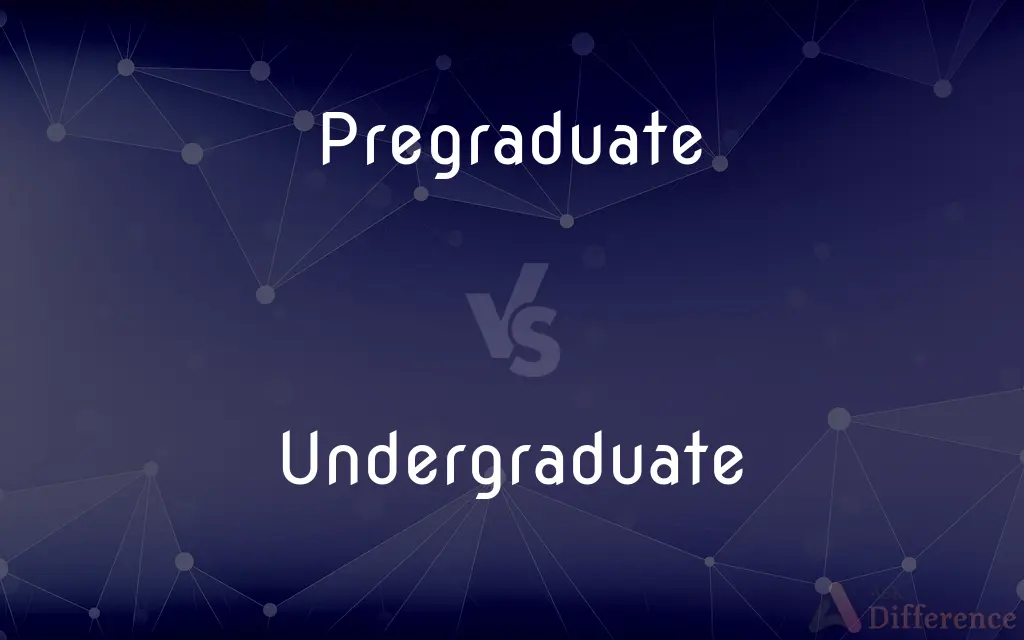Pregraduate vs. Undergraduate — What's the Difference?
By Urooj Arif & Fiza Rafique — Updated on March 12, 2024
Pregraduate refers to the stage before embarking on a graduate program, while undergraduate denotes a student pursuing a bachelor's degree.

Difference Between Pregraduate and Undergraduate
Table of Contents
ADVERTISEMENT
Key Differences
Pregraduate is a less commonly used term that typically describes individuals who have completed an undergraduate degree and are preparing for or considering enrollment in a graduate program. This phase involves activities like gaining relevant work experience, conducting research, or completing prerequisite courses. On the other hand, an undergraduate student is enrolled in a post-secondary education program leading to a bachelor's degree, which is the foundational level of higher education typically pursued after high school.
Undergraduate studies lay the groundwork in a specific field, offering a broad overview and essential knowledge. Programs are designed to equip students with the skills and understanding necessary for entry-level positions or further academic pursuits. In contrast, pregraduate activities are focused on bridging the gap between undergraduate education and advanced study, helping individuals strengthen their academic and professional profiles for competitive graduate programs.
Undergraduate programs are characterized by a structured curriculum, including general education requirements and major-specific courses. These programs aim to foster critical thinking, communication skills, and a foundational understanding of the chosen discipline. Whereas the pregraduate stage may involve more self-directed efforts like engaging in research projects, internships, or additional coursework to build on the undergraduate foundation and prepare for the rigors of graduate study.
The undergraduate experience is marked by a transition from general education to focused study in a major, often including opportunities for internships, study abroad, and extracurricular involvement. Pregraduate activities, meanwhile, are tailored to individual goals and may include gaining relevant work experience, participating in academic research, or undertaking advanced coursework to prepare for specialized graduate programs.
Choosing between direct entry into the workforce or pursuing graduate studies is a significant decision for many at the pregraduate stage. This period involves careful consideration of career goals, academic interests, and the potential benefits of advanced degrees, while undergraduate education is more about exploring interests and building a broad academic and professional foundation.
ADVERTISEMENT
Comparison Chart
Definition
An individual preparing for graduate studies.
A student pursuing a bachelor's degree.
Focus
Preparing for advanced academic or professional pursuits.
Foundational education in a chosen field.
Curriculum
Self-directed, focused on strengthening academic and professional profiles.
Structured, including general and major-specific courses.
Goal
To enhance readiness for graduate programs.
To obtain a bachelor's degree.
Activities
Research, work experience, prerequisite courses.
Coursework, internships, extracurriculars.
Compare with Definitions
Pregraduate
Stage before entering graduate studies.
Pregraduates often take additional courses to prepare for their master's program.
Undergraduate
A student in a bachelor's degree program.
The undergraduate student declared a major in biology.
Pregraduate
May include completing prerequisite courses.
Pregraduates sometimes enroll in post-baccalaureate programs to meet prerequisites.
Undergraduate
The first level of post-secondary education.
Undergraduate courses lay the groundwork for future specialization.
Pregraduate
Involves gaining relevant experience or research.
The pregraduate interned at a lab to gain research experience.
Undergraduate
Involves a mix of general and specialized studies.
Undergraduates must complete general education requirements.
Pregraduate
A period of academic and professional preparation.
He used his pregraduate year to volunteer and build his resume.
Undergraduate
Prepares students for entry-level careers or further study.
Many undergraduates apply to graduate school in their senior year.
Pregraduate
Transition from undergraduate to graduate mindset.
Pregraduates attend seminars and workshops to understand graduate-level work.
Undergraduate
Can include internships and study abroad opportunities.
The undergraduate participated in a summer internship.
Pregraduate
Of or pertaining to those studies that take place before a student completes a degree course.
Undergraduate
A college or university student who has not yet received a bachelor's or similar degree.
Pregraduate
A person who is taking an academic course but has not yet graduated.
Undergraduate
Of, relating to, or characteristic of undergraduates
Undergraduate courses.
Undergraduate humor.
Undergraduate
Having the standing of an undergraduate
An undergraduate transfer student.
Undergraduate
A student at a university who has not yet received a degree.
Undergraduate
Of, relating to, or being an undergraduate.
After completing my undergraduate studies, I embarked on a career in publishing.
Undergraduate
A member of a university or a college who has not taken his first degree; a student in any school who has not completed his course. Contrasted with graduate student.
Undergraduate
Of or pertaining to an undergraduate, or the body of undergraduates.
Undergraduate
A university student who has not yet received a first degree
Common Curiosities
What should I focus on during my pregraduate stage?
Focus on activities that enhance your academic profile and professional skills relevant to your intended field of graduate study, such as research, internships, or prerequisite coursework.
Do I need to declare a major as an undergraduate?
Yes, declaring a major is a typical requirement in undergraduate programs, allowing you to focus on a specific field of study.
How long does the undergraduate phase last?
Undergraduate programs typically last 4 years, but this can vary based on the country, institution, and specific program structure.
Can pregraduate activities enhance my application to graduate school?
Yes, engaging in research, gaining relevant work experience, and completing advanced courses can strengthen your graduate school application.
What is the benefit of undergraduate internships?
Internships provide practical experience, professional networking opportunities, and can clarify career interests and goals.
What distinguishes an undergraduate from a pregraduate?
An undergraduate is actively pursuing a bachelor's degree, focusing on foundational education, while a pregraduate is preparing for graduate studies, often through specialized experiences or coursework.
Is it necessary to have undergraduate experience to be considered a pregraduate?
Typically, pregraduate status implies completion of or nearing completion of undergraduate studies, as it involves preparing for the next academic level.
Are pregraduate programs formalized in universities?
Some universities offer structured pregraduate or post-baccalaureate programs, but the pregraduate stage can also involve individualized preparation outside formal programs.
Can I apply to graduate programs in a different field than my undergraduate major?
Yes, but you may need to complete additional prerequisite courses or gain relevant experience in the new field during your pregraduate stage.
How do I know if I'm ready for graduate studies?
Assessing your academic preparation, professional experiences, and clarity about your research interests and career goals can help determine your readiness for graduate studies.
Share Your Discovery

Previous Comparison
Fledge vs. Fletch
Next Comparison
Wife vs. SpouseAuthor Spotlight
Written by
Urooj ArifUrooj is a skilled content writer at Ask Difference, known for her exceptional ability to simplify complex topics into engaging and informative content. With a passion for research and a flair for clear, concise writing, she consistently delivers articles that resonate with our diverse audience.
Co-written by
Fiza RafiqueFiza Rafique is a skilled content writer at AskDifference.com, where she meticulously refines and enhances written pieces. Drawing from her vast editorial expertise, Fiza ensures clarity, accuracy, and precision in every article. Passionate about language, she continually seeks to elevate the quality of content for readers worldwide.
















































